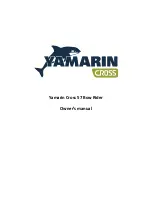
5
Transporting Your Mariner
To transport your kayak securely, we suggest that you install a rigid bar, sport rack system on the roof of your vehicle. Your boat
will remain most stable when loaded upside down. If you are unlikely to encounter rain during your road trip, you can also load
it with the hull down.
* Do not drag your boat! Dragging your Mariner may cause damage to the rudder blade.
Caring for Your Mariner
A
fresh water rinse
for the hull and all moving parts is all that is necessary to keep your boat clean. It is heartily recommended
after paddling in salt water, especially if your boat is outfitted with a rudder system. Thoroughly rinse the rudder, rudder cables,
and foot braces with fresh water to remove dirt, sand and salt.
We also recommend that you treat your First Class seat with a
mold retardant cleaner
(found at grocery or home improvement
stores) if you use it infrequently or if it will be stored in a moist or poorly circulated environment.
You should periodically
lubricate
all moving parts (like the foot braces, or rudder) to keep them in top working order. We rec-
ommend using 303® Aerospace Protectant™ available at outdoor specialty and select home improvement retailers. For polyeth-
ylene hulls,
303
® Aerospace Protectant™ can also be used to protect the luster of the boat’s surface. Learn more about
303
®
Aerospace Protectant™ at www.303products.com.
Polyethylene
Polyethylene
is a tough, resilient material which can withstand a reasonable amount of impact and usage over rough surfaces.
However, over time and with continued use, abrasions can reduce the hull’s ability to glide smoothly through the water. You can
minimize raised texture on the hull by scrapping the polyethylene ridges off with a sharp knife or buffing them out with sand
paper. Also, please remember that the hull is tough, not indestructible, but minor damages may be repairable. Contact your local
Native Watercraft dealer for additional information and assistance regarding polyethylene repair
.
Storage Tips
The ideal environment for storing your kayak is a shaded, dry space. Never store your kayak in direct sunlight. Position it up-
side down with each end supported on sturdy, cushioned racks. Wood 2 x 4’s covered with carpet or closed-cell foam work nice-
ly (coverings that will either dry quickly or not absorb moisture will keep mildew away).
Polyethylene softens somewhat when it is exposed to extremely warm conditions. If your kayak is strapped tightly to a roof rack
or sitting on a storage rack during a series of hot days, it may deform. You can encourage your boat to “remember” its original
shape by unstrapping it and setting it on a flat or padded surface in the sunlight but it may not completely regain its shape if it has
been deformed by severely tightened straps or ropes.
Basic Gear
When you paddle you should always carry safety equipment, carry appropriate personal gear, use a comfortable paddle, and wear
a PFD (personal flotation device).
Paddle
The choice of a paddle is as personal as the choice of your boat. Factors to consider in selecting your paddle include blade shape,
length, weight and material. Synthetic paddles are the most damage resistant. Composite models will generally be lighter and
better if you’ll be paddling for long periods of time. Most paddlers use paddles between 225 and 240 cm in length: you should
try different lengths and types of paddles before you make a purchase, just as you would test paddle your boat.
Take-apart paddles offer the ability to change blade angle (“feather”) to suit your preference, and are easy to store and transport.
A spare paddle is good to have as well. It can be an inexpensive take-apart paddle that can be stowed easily on deck.
PFD – Personal Flotation Device
A comfortable and securely-fitting PFD is an absolutely essential paddling accessory that should be worn when you’re in your
kayak. Try your PFD on before you make a purchase, to be sure it fits comfortably. Swing your arms and rotate your torso to
make sure you can move your arms freely without feeling restricted. If it does, adjust the outfitting or try another model / size.
























